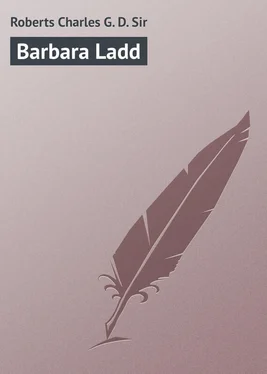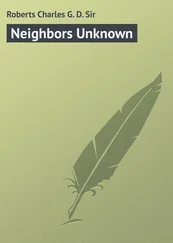Charles Roberts - Barbara Ladd
Здесь есть возможность читать онлайн «Charles Roberts - Barbara Ladd» — ознакомительный отрывок электронной книги совершенно бесплатно, а после прочтения отрывка купить полную версию. В некоторых случаях можно слушать аудио, скачать через торрент в формате fb2 и присутствует краткое содержание. ISBN: , Жанр: foreign_prose, foreign_language, на английском языке. Описание произведения, (предисловие) а так же отзывы посетителей доступны на портале библиотеки ЛибКат.
- Название:Barbara Ladd
- Автор:
- Жанр:
- Год:неизвестен
- ISBN:http://www.gutenberg.org/ebooks/34270
- Рейтинг книги:4 / 5. Голосов: 1
-
Избранное:Добавить в избранное
- Отзывы:
-
Ваша оценка:
- 80
- 1
- 2
- 3
- 4
- 5
Barbara Ladd: краткое содержание, описание и аннотация
Предлагаем к чтению аннотацию, описание, краткое содержание или предисловие (зависит от того, что написал сам автор книги «Barbara Ladd»). Если вы не нашли необходимую информацию о книге — напишите в комментариях, мы постараемся отыскать её.
Barbara Ladd — читать онлайн ознакомительный отрывок
Ниже представлен текст книги, разбитый по страницам. Система сохранения места последней прочитанной страницы, позволяет с удобством читать онлайн бесплатно книгу «Barbara Ladd», без необходимости каждый раз заново искать на чём Вы остановились. Поставьте закладку, и сможете в любой момент перейти на страницу, на которой закончили чтение.
Интервал:
Закладка:
The negroes of the plantation, who seemed to Barbara akin to the animals, came next to these in her regard, and indeed were treated with an indulgence which made them almost literally lay their black necks in the dust for her little feet to step on. But with people of her own class she was apt to be hasty and ungracious. Their feelings were of small account in her eyes – certainly not to be weighed for a moment against those of a colt or a kitten. There was one sweet-eyed and lumbering half-grown puppy which Barbara's father – not for an instant, indeed, believing anything of the sort – used to declare was more precious to her than himself. But her old black "Mammy" 'Lize used to vow there was more truth than he guessed in "Marse Ladd's foolin'."
However, when a fever snatched the gentle priest away from the scene of his love and kindly ministrations, the child's true self emerged through its crust of whim and extravagance. Stricken beyond a child's usual capacity to feel or realise such a blow, she was herself seized with a serious illness, after which she fell into a dejection which lasted for the better part of a year. In her desolation she turned to her animals rather than to her human companions, and found the more of healing in their wordless sympathy.
At last, youth and health asserted themselves, and once more Barbara rode, paddled, swam, tyrannised, and ran wild over the plantation, while relatives from Maine to Maryland wrangled over her future.
There was one young uncle, her mother's only brother, whom Barbara decided to adopt as her sole guardian. But other guardians came to another decision. Uncle Bob Glenowen was an uncle after Barbara's own heart, but a little more disciplined and reasonable than herself. The two would have got on delightfully together – together careering over the country on high-mettled horses, together swimming and canoeing at the most irregular hours, together lauding and loving their four-foot kindred and laughing to scorn the general stupidity of mankind. But Uncle Glenowen had little of gold or gear, and his local habitation was mutable. He loved Barbara too well not to recognise that she should grow up under the guidance of steadier hands than his. It was finally settled – Barbara's fiery indignation being quite disregarded – that she should go to her father's younger sister, Mistress Mehitable Ladd, in Second Westings.
Mistress Ladd was a self-possessed, fair-faced, aristocratic little lady, with large blue eyes and a very firm, small mouth. She was conscientious to a point that was wont to bring her kindness, at times, into painful conflict with her sense of duty. The Puritan fibre ran in unimpaired vitality through the texture of her being, with the result that whenever her heart was so rash as to join issue with her conscience, then prompt and disastrous overthrow was the least her heart could expect for such presumption. In the matter of Barbara's future, however, Distress Mehitable felt that duty and inclination ran together. She had loved her brother Winthrop with unselfish and admiring devotion, and had grieved in secret for years over his defection from the austere fold of the Congregationalists to what she regarded as the perilously carnal form and ceremony of the Church of England. Her hampered spirit, her uncompleted womanhood, yearned toward Barbara, and she shuddered at the idea of Winthrop's child growing up untaught, unmothered, uncontrolled. She made up her mind that Barbara should come to Second Westings, become a daughter to her, and be reared in the purity of unsullied Congregationalism. With a sigh of concordant relief it was recognised by the other relatives that Mehitable was right. They washed their hands of the child, and forgot her, and were thankful – all but Uncle Bob. And so Barbara went to Second Westings.
CHAPTER IV
Little enough, indeed, would Second Westings ever have seen of the heartsore and rebellious child, but for this Uncle Bob. Searching his own spirit, he understood hers; and maintaining a discreet silence as to the chief points of his discovery, he set himself the duty of accompanying Barbara on the long, complicated journey to Connecticut. Not content with delivering his charge into the hands of Mistress Mehitable, – whom he liked despite her uneasy half-disapproval of himself, – he stayed long summer weeks at Second Westings, thus bridging over for Barbara the terrible chasm between the old life and the new, and by his tactful conciliation on every side making the new life look a little less hatefully alien to her. He took her riding all over the township; he took her canoeing on the lake, and down the outlet to its junction with the river; and so not only won her a freedom of movement hitherto unheard-of among the maidens of Second Westings, but also showed her that the solace of wild woods and sweet waters was to be found no less in Connecticut than in her longed-for Maryland. Moreover, Uncle Bob had "a presence." Second Westings scrutinised him severely, all ready to condemn the stranger folk to whom Winthrop Ladd had turned in his marrying. But Second Westings felt constrained to acknowledge at once that Winthrop Ladd had married within his class. To high and low alike – and the line between high and low was sharply drawn at Second Westings – it was obvious that the sister of Mr. Robert Glenowen must have been gently born. Those who would not let themselves be warmed by Uncle Bob's bright heartsomeness were unable to withhold acknowledgment of his good breeding. Mistress Mehitable, though antagonised by vague gossip as to his "wildness," nevertheless recognised with serious relief that no common blood had been suffered to obscure the clear blue stream whose purity the Ladds held precious. "Light, I fear – if not, in other surroundings, ungodly; but beyond all cavil a gentleman!" pronounced the Reverend Jonathan Sawyer, flicking snuff from his sleeve with white, scholarly fingers. He was not so innocent as to attach too much importance to Uncle Bob's devout attitude through those interminable services which made a weekly nightmare of the Connecticut Sabbath; but he had found a reserved satisfaction in the young man's company over a seemly glass and a pipe of bright Virginia. He had a feeling that the visitor's charm was more or less subversive of discipline, and that it would be, on the whole, for the spiritual welfare of Second Westings if the visit should be brief; but meanwhile he took what he could of Uncle Bob's society. Class against creed, and a fair field, and it's long odds on class.
But in the minds of Doctor John and Doctor Jim Pigeon – physicians, brothers, comrades, fierce professional rivals, justices of the peace, and divinely self-appointed guardians of the sanctity of caste for all the neighbourhood – there were no misgivings. Their instincts accepted Bob Glenowen at first glance. Their great, rugged faces and mighty shoulders towering over him, – and Uncle Bob himself was nowise scant of stature, – they looked at him and then into each other's eyes; and agreed, as they did on most subjects outside the theory and practice of medicine.
"You are right welcome to Second Westings, Mr. Glenowen!" exclaimed Doctor Jim, in a big, impetuous voice, grasping his hand heartily.
"And we trust that you may be slow to leave us, Mr. Glenowen!" added Doctor John, in a voice which any competent jury, blindfolded, would have pronounced identical.
Recognising the true fibre and the fineness of these two big, gentle autocrats, Uncle Bob made a special point of commending Barbara to their hearts – in which commending he so well sped, and indeed was so well seconded by Barbara herself, who loved them from the moment when her eyes first fell upon them, that they presently constituted themselves special guardians to the little maid, and indulgent mitigators of Mistress Mehitable's conscience. The manner in which they fulfilled the sometimes conflicting duties of these offices will appear pretty persistently in the sequel.
Читать дальшеИнтервал:
Закладка:
Похожие книги на «Barbara Ladd»
Представляем Вашему вниманию похожие книги на «Barbara Ladd» списком для выбора. Мы отобрали схожую по названию и смыслу литературу в надежде предоставить читателям больше вариантов отыскать новые, интересные, ещё непрочитанные произведения.
Обсуждение, отзывы о книге «Barbara Ladd» и просто собственные мнения читателей. Оставьте ваши комментарии, напишите, что Вы думаете о произведении, его смысле или главных героях. Укажите что конкретно понравилось, а что нет, и почему Вы так считаете.












